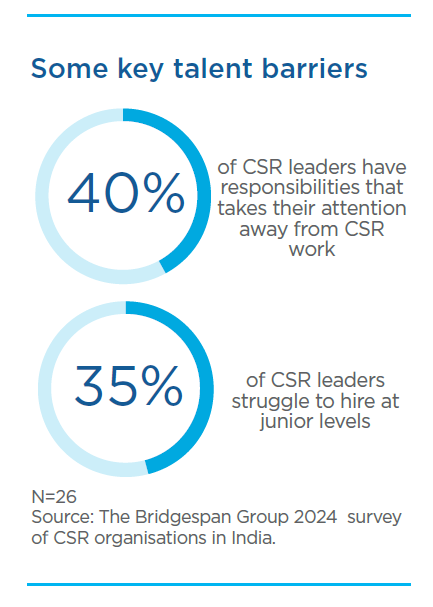In the years since corporate social responsibility (CSR) regulations came into force in 2014, the CSR sector has grown to comprise 24,000 companies spending about INR 30,000 crores (approximately $3.5 billion) on a multitude of issues, geographies, and communities. And the stakes will only grow in the coming years, especially as middle-market and large CSR players, which account for 60 percent of CSR spend, increase their giving, set more aspirational goals, and consider bolder approaches for impact. Some are collaborating more with other funders, governments, and non-governmental organisations (NGOs), while others are investing in innovation on the back of technology breakthroughs or filling gaps in a dynamically evolving ecosystem oriented toward improving lives and communities.
These organisations face a critical question:
Can they build the governance, leadership, and talent infrastructure to match the size of their giving and impact aspirations?
 The groundwork has been laid, with most organisations dedicating governance structures and teams to CSR. And CSR leaders care about talent – almost two-thirds of CSR leaders ranked “best-in-class talent” as one of the three most important ingredients for CSR success in a survey that we conducted as part of this research.
The groundwork has been laid, with most organisations dedicating governance structures and teams to CSR. And CSR leaders care about talent – almost two-thirds of CSR leaders ranked “best-in-class talent” as one of the three most important ingredients for CSR success in a survey that we conducted as part of this research.
Still, 82 percent of CSR leaders believe they need to hire and/or upskill talent to enhance effectiveness, according to a 2024 study by Give Grants (for which The Bridgespan Group was the research partner). And in Bridgespan’s survey for this research, a significant portion of CSR leaders highlighted that their CSR governance members can deepen their understanding of the social sector, 40 percent of the CSR leaders have responsibilities that take their attention away from CSR work, and 35 percent struggle to hire at junior levels.
This report shines a spotlight on effective talent and governance practices and surfaces common challenges and opportunities in the CSR ecosystem. We interviewed 52 stakeholders in the CSR ecosystem (including CSR heads, business leaders, NGO partners, and other ecosystem actors) and surveyed 26 CSR heads, in addition to conducting secondary research.
The good news is that there is significant opportunity for CSR organisations to learn from their peers. We elevate 11 practices across CSR governance, leadership, and teams that can help CSR organisations live into their full potential and bring them to life with real-world examples.
Governance: Setting the Tone from the Top
![]()
- Activating CSR governance members’ skills and experience. Governance members can apply their functional and domain expertise to hone CSR strategies, open up their networks to forge partnerships, and use their voices to elevate issues externally.
- Establishing supplementary structures. Supplemental governance bodies, such as advisory boards, bring in external subject matter expertise, aid decision-making, and create corporate champions for CSR projects.
- Orienting CSR governance members on the nuances of the social sector. Field immersions and engagement with NGOs and sector leaders help governance members lean into impact.
Leadership: Advancing CSR Leadership
![]()
- Positioning CSR heads strategically within the organisation. Proximity to the C-suite elevates the strategic importance of CSR in the organisation.
- Letting CSR leaders lead. CSR heads are more motivated and make decisions more efficiently when they enjoy operational autonomy.
- Making space for professional development. Engaging deeply with stakeholders and peers helps on-the-ground learning and cross-pollination of ideas.
- Developing the next line of leadership. Building a pipeline of leaders can ensure succession plans succeed and empower teams (and leaders) along the way.
Teams: Strengthening CSR Teams
![]()
- Crafting a compelling value proposition to attract and retain talent. Exposure to on-the-ground work can inspire potential recruits and development programmes that demonstrate an exciting career path can motivate team members.
- Offering professional development beyond training. Developing talent means more than formal training; it also involves engaging directly with social-sector experts and corporate leaders for on-the-job learning and real-time coaching.
- Leveraging corporate capabilities to complement the CSR team. Corporates’ domain and functional expertise, networks, and geographic presence can be immensely valuable.
- Building a culture of empathy and collaboration. Working with NGOs as equal partners can help teams navigate relationships and build trust in the field.
Bear in mind that these practices make different asks of different leaders. Some speak to practices that corporate leaders should consider to structure governance bodies and lines of reporting, while others suggest how governing body members might support CSR leaders or how CSR leaders might support their team members. While some of these practices may seem intuitive, they require attention and investment. We offer sets of reflection questions to help leaders consider how they might adapt their practices.
We also offer a development agenda for the sector writ large. Corporates, ecosystem actors (e.g. education and training institutions), and policymakers all stand to benefit from systematically investing in the people who make up the sector, equipping boards, leaders, and teams to fulfill their impact aspirations.
The development agenda includes:
- Development programmes for CSR committees and corporate foundation boards. Greater opportunity for CSR governance members to interact with communities, social-sector leaders, and CSR governance peers, as well as to participate in formal professional education programmes.
- Coaching and peer engagement for senior CSR professionals and leaders. Opportunities for CSR leaders to get on-demand guidance from seasoned practitioners and engage with peer leaders through well-curated networks and forums.
- Practical and flexible professional development programmes for junior and mid-level CSR professionals. Co-developed programmes by sector leaders and CSR practitioners on topics such as stakeholder engagement; measurement, evaluation, and learning; and communications.
- Public narratives positioning CSR as an aspirational career. Positioning CSR as an aspirational career by amplifying public narratives around CSR’s impact in India, providing potential recruits with first-hand exposure to CSR roles (e.g. internships, shadowing) and showcasing stories of successful CSR careers.
CSR is increasingly seen as a distinct function within organisations, one that requires thoughtful governance, strategic leadership, and unique skills. We hope this report will spur conversation, reflection, and action – individually, organisationally, and as an ecosystem – to truly supercharge talent and governance for impact.






